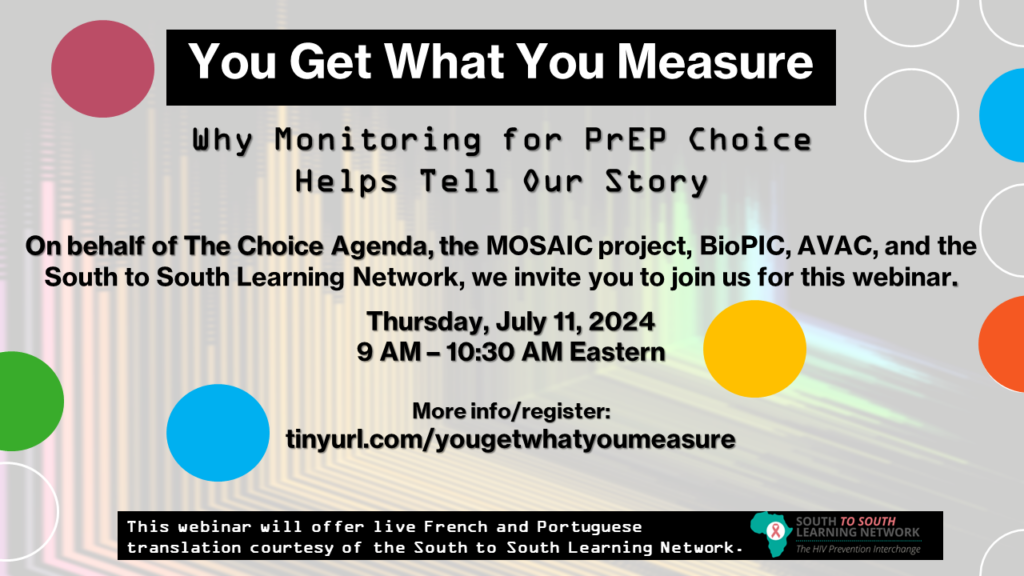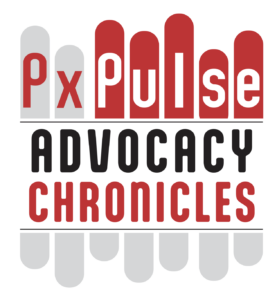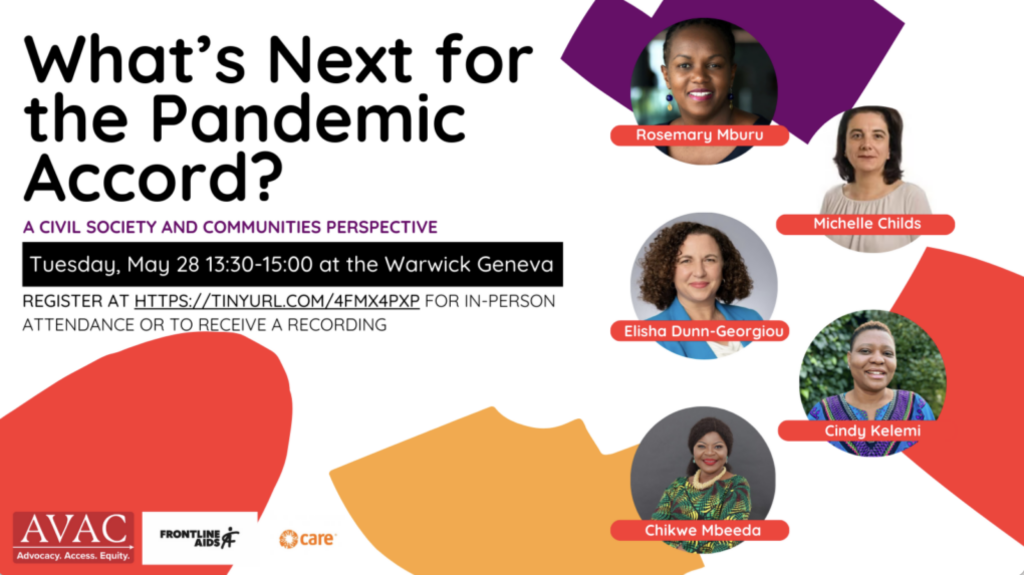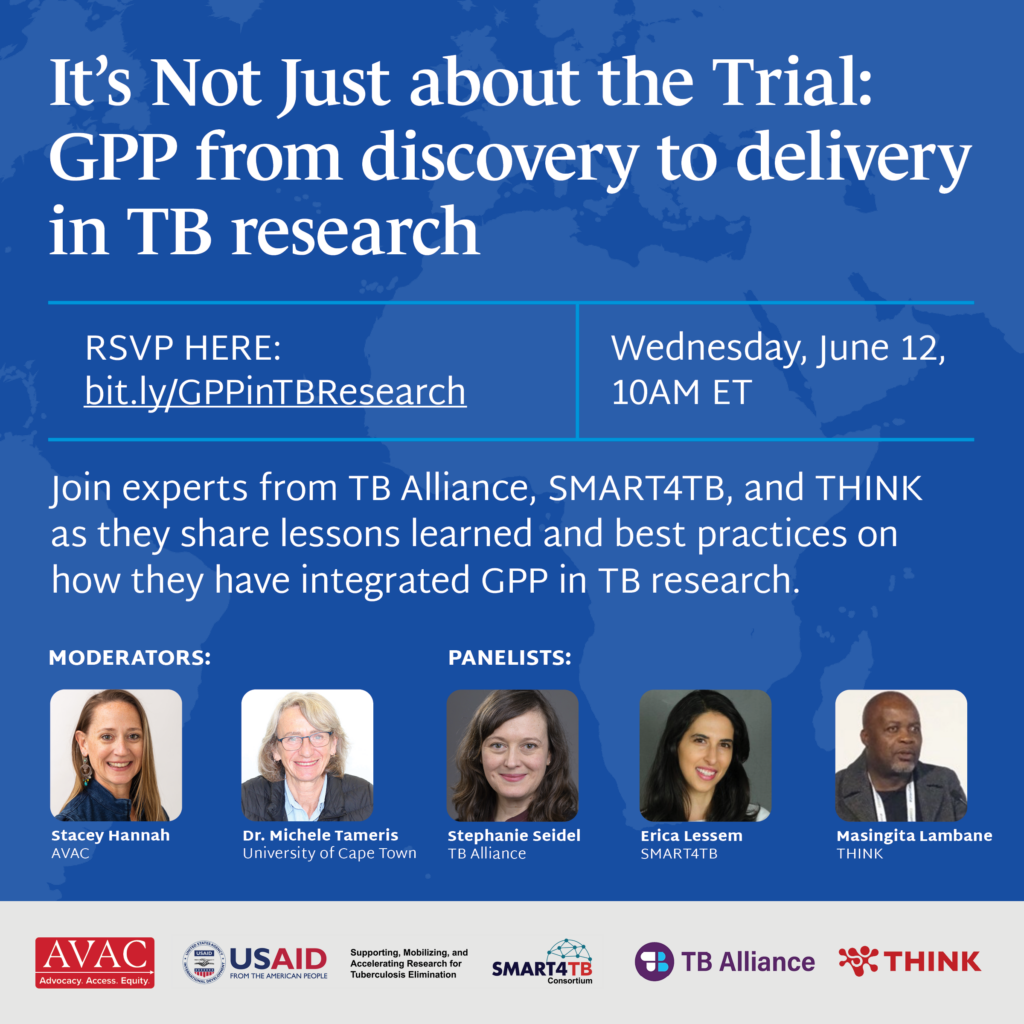If you’re having trouble making sense of all of the initiatives around pandemic prevention, preparedness, and response (PPPR) this year, don’t worry—you’re not alone! This Advocates Guide provides a reference for the relevant information all in one place. The contents explain the major initiatives, key dates for involvement, how to get involved and make sure your priorities are heard by decision makers.
Advocates’ Guide for PPPR
Avac Event
You Get What You Measure: Why Monitoring for PrEP Choice Helps Tell Our Story
The data we collect on a program determines its path and priorities. This webinar covered the current state of PrEP M&E and efforts to improve and simplify the data we collect, allowing our data to better reflect how people are using PrEP, support PrEP choice amongst the growing array of PrEP methods, and enhance the stories we can tell about PrEP program implementation.
Presenters:
- Katharine Kripke, Avenir Health, MOSAIC
- Jessica Williamson, Avenir Health, MOSAIC
Panelists:
- Omolabake Ekundayo, Ministry of Health Nigeria
- Dr. Herbert Kadama, Ministry of Health Uganda
- Ramatsoai Soothoane, Jhpiego, MOSAIC Project Lesotho
Moderator:
- Adaobi Olisa, FHI360, MOSAIC Project Nigeria
This webinar offered live French and Portuguese translation, courtesy of the South-to-South Learning Network in Africa.
Co-sponsors:
- BioPIC
- South-to-South Learning Network
- The MOSAIC Project

Recording in English / French Audio Recording / Portuguese Audio Recording / Webinar Slides / Strengthening and Harmonising PrEP Indicators
PxPulse: The Advocacy Chronicles with SMUG’s Allan Mwasa

On this episode of The Advocacy Chronicles, we’re speaking with Nsubuga Allan Mwasa, a Ugandan activist, clinical psychologist and an advocate for mental health and LGBTQ+ rights. Allan serves as Strategic Initiatives Manager at Sexual Minorities Uganda, or SMUG, which has been at the forefront of the fight for LGBTQ rights, often facing severe challenges including legal battles and violent opposition.
Despite these challenges, SMUG continues to advocate for the fundamental human rights of the LGBTQ community. It does this through legal action, public awareness campaigns, and international advocacy. SMUG is also part of Convening For Equality Uganda, or CFE, a coalition of civil society groups dedicated to challenging Uganda’s Anti-Homosexuality Act. The Anti-Homosexuality Act (AHA), signed into law in May 2023, significantly increased discrimination and violence against the LGBTQ+ community. Despite widespread international condemnation and ongoing legal challenges, the law was upheld by the Constitutional Court in April 2024. Petitioners have since filed an appeal to the Supreme Court seeking to overturn the law, which remains one of the strictest in the world, including life imprisonment and death penalty for certain offenses.
Listen
Resources
- Donate to support SMUG, CFE, The Strategic Response Team (SRT), and their work responding to human rights violations against LGBTIQ+ communities in Uganda
- Eteeka Lyayhita…Unwanted, Outlawed and Illegal: The Cry of LGBTIQ+ Ugandans, SRT Report, June 2024
- Discrimination in Public Health: How Funders Should Fight Laws Like Uganda’s Anti-Homosexuality Act, Center for Strategic and International Studies
- Uganda: Court Upholds Anti-Homosexuality Act, Human Rights Watch
- Eteeka Lyayita…Lives At Risk, SRT Report, September 2023
- Sharp rise in homophobia in East Africa sparks fear of violence, Health Policy Watch
- UN rights experts condemn Uganda’s “egregious” anti-LGBT legislation, UN News
Follow the Conversation at Convening For Equality Uganda’s Social Media Accounts
- @CFE_Uganda and #RepealAHA23 on X
- @conveningforequality on Threads
- @conveningforequality on Instagram
Tracking PrEP Rollout & Learning Lessons
Accelerating the rollout of the full range of proven HIV prevention options depends on learning from what’s been done in the past and investing in coordination and innovation to put improved solutions in place. The Biomedical Prevention Implementation Collaborative (BioPIC) is doing just that. Over the last two years, BioPIC—a project led by AVAC with support from the Gates Foundation—has been gathering and sharing evidence on these critical lessons to ensure the next generation of HIV prevention products reaches everyone who needs and wants them with much greater speed and equity.
What We’re Learning—Highlights from 2024 Convenings
An ongoing series of think tanks, convened by BioPIC and WHO since 2021, are generating key insights for people-centered product delivery. Below, read the latest reports from these think tanks that are informing decision-making on priorities for accelerating access to PrEP. Go to the BioPIC’s page on PrEPWatch to find reports on all think tanks since 2021.
- Early Insights from EBONI and PILLAR, February 2024: Early insights from ViiV Healthcare, the manufacturer of CAB for PrEP, from two CAB for PrEP implementation studies, EBONI and PILLAR. Conducted by ViiV in the US, these are among the first studies gathering data in real-world settings. Learn more
- Taking Stock of PrEP Evidence, March 2024: An analysis of current data and priority evidence gaps. This inquiry was not focused on any one PrEP product, and its findings are informing the focus of future think tanks. Learn more
- Linking Modellers with the Latest Implementation Science Evidence, March 2024: A consideration of the latest modelling data and insights on injectable cabotegravir (CAB) for PrEP. Read about the biggest takeaways from CAB for PrEP modelling here, and learn more about the big questions that require further inquiry here
- Discussing Early Results from the SEARCH Dynamic Choice Study, April 2024: Professor Moses Kamya of Makerere University shares early insights from the SEARCH Dynamic Choice Study in Kenya and Uganda, which gave participants a choice between oral PrEP, PEP, and CAB for PrEP, and analyzes the role of choice in PrEP coverage. Watch here
- PrEP and the Role of HIV Self-Testing, May 23: Highlights from the WHO guidance on use of self-testing (HIVST) as an innovative way to increase PrEP access and coverage and further simplify PrEP delivery. Panelists also share experiences with procurement, costing, rollout and scale-up. Watch Here

As other new biomedical HIV prevention products roll out, BioPIC will continue to hold strategic convenings, identify and address evidence gaps, and work to accelerate equitable product introduction. To learn more efforts to coordinate the introduction of CAB for PrEP, check out the JIAS article Shaping and coordinating the implementation science agenda for injectable cabotegravir for PrEP: the role of the Biomedical Prevention Implementation Collaborative (BioPIC). To learn what’s needed to better coordinate rollout for not-yet-approved products in Phase III clinical trials, check out BioPIC’s Adaptable Product Introduction Framework.
We hope you will book mark these resources, and stay up to date on findings from future think tanks and webinars in 2024 on the BioPIC page of PrEPWatch.
What’s Next for the Pandemic Accord? A civil society and communities perspective
This side event, co-sponsored with Care and Frontline AIDS, was part of the World Health Assembly and featured expert panelists discussing what’s promising in the Pandemic Accord, what we expect from governments, and what’s missing for successful implementation. Selected panelists came from different health areas but all have experience in pandemic prevention, preparedness, and response.
This panel also helped civil society prepare for the coming year and gain capacity to meaningfully engage in advocacy around implementation of the Accord.

Avac Event
The GPP Body of Evidence: GPP Monitoring and Evaluation Frameworks, REAL and REAL2
GPP is an essential part of clinical trials research, and an ethical imperative to creating equitable and effective clinical trials. GPP is created by and for communities, so it necessarily looks different and takes multiple forms in different cultural contexts. This kind of responsiveness is inherent to GPP, but it also makes it difficult to measure and evaluate.
In this webinar, we learned from the Realist Review of Community Engagement and the REAL2 review of participatory research that both examined frameworks for evaluating community engagement efforts, as well as the Global Health Network’s new course on evaluation, and other evaluation efforts in the field of GPP.
Moderator:
- Jessica Salzwedel, AVAC
Panelists:
- Alun Davies, The Global Health Network
- Sassy Molyneux, KEMRI-Wellcome Trust
- Dr. Robin Vincent, Oxford University
Recording / Alun Davies Slides / Sassy Molyneux Slides / Dr. Robin Vincent Slides
Avac Event
It’s Not Just about the Trial: GPP from discovery to delivery in TB research
GPP enhances every stage of the research lifecycle. In this webinar, our partners at TB Alliance, SMART4TB, and THINK will shared experiences, lessons learned, and innovative approaches in integrating GPP at the organizational, network and situational level, from drug development through delivery.
Moderators:
- Stacey Hannah, AVAC
- Dr. Michele Tameris, University of Cape Town
Panelists:
- Stephanie Seidel, TB Alliance
- Erica Lessem, SMART4TB
- Masingita Lambane, THINK

Recording / Stephanie Seidel Slides / Erica Lessem Slides / Masingita Lambane Slides
Fighting the Same Fight Again
Authors: Samantha Rick (AVAC), Quentin Batreau (GFAN), Eolann MacFadden (Frontline AIDS)
Pandemic Accord negotiations have so far failed to effectively engage advocate and civil society voices. With key parts of the Pandemic Accord moving toward further negotiation over the next few years, the Coalition of Advocates for Global Health and Pandemic Preparedness calls on advocates in and around the World Health Assembly to continue to rally for meaningful engagement with civil society and community and leadership roles for both in the ongoing multilateral process for pandemic prevention, preparedness, and response (PPPR).
For decades civil society and community organizations have been recognised and legitimately engaged as vital stakeholders and leaders in the HIV response. But this principle of inclusion has been inadequately upheld in other health areas, and vitally important initiatives, including the negotiations of the Pandemic Accord, have failed to build on the success of the HIV response and fully utilize existing models and mechanisms for engagement. Without them, these efforts exclude critical stakeholders when they should integrate civil society organizations (CSOs) as a crucial driver of policy and programming. Although certain initiatives have created some opportunities for CSO involvement, organized campaigns and public outcry have been necessary to garner a seat at the table. With every new program, fund, or secretariat, advocates are compelled to engage in the same repetitive battle to obtain a minimum of two voting seats and consultation prior to decision-making.
Civil society representation at the World Health Assembly has been reduced, a formal mechanism for engagement at UN High Level Meetings has been rejected, requests for even observer status during Pandemic Accord negotiations have also been rejected, and civil society and community advocates have experienced hostility at international convenings such as International Conference on AIDS and STIs in Africa (ICASA). Preventing, preparing, and responding to disease outbreaks requires public trust, understanding of regional or cultural ways of working, geographical limitations, and the true needs of communities. We cannot build effective health infrastructure by erecting barriers to civil society and community leadership.
It is absolutely crucial that civil society and communities band together to demand meaningful engagement in the processes that follow and refuse to permit governments and institutions from rolling back CSO access and decision-making power even further.
We have seen throughout the 40 years of the HIV/AIDS response that meaningful engagement turns the tide when biomedical innovations fall short of their potential because of real-world challenges. Decision makers, government representatives, and multilateral institutional leaders must enshrine a baseline level of meaningful civil society engagement practices where and when international decisions are made. As lessons from the global HIV response show us, it is possible, if not probable, that many of the outstanding issues in the Pandemic Accord could have been solved with civil society input and influence, as knowledge-brokers who bring unique insights, find solution, and foster trust where it’s needed most.
The Coalition of Advocates for Global Health and Pandemic Preparedness is a group of organizations advocating for an integrated and holistic approach to preparedness that emphasizes equity, inclusion, and synergies of multiple global health programs in advancing preparedness. We believe that all global health initiatives should be centered on the key principles of community leadership, equity, access, and human rights and that efforts to fight current epidemics and strengthen health systems are central to equitable pandemic preparedness.
The biggest lesson from the fight against HIV, TB, and malaria is that if space is not reserved for civil society, we must take it – “Nothing For Us Without Us”. Join us at the World Health Assembly or watch the recording of our side event focused on civil society engagement if you can’t make it to Geneva, and keep demanding meaningful engagement in every global health initiative.
Avac Event
Illinois PrEP Summit 2024: Disrupting Disparities and Advancing Access
The conference focuses on advancing biomedical HIV prevention to help achieve Getting to Zero by 2030. Key summit goals include improving access, addressing disparities, fostering research and promoting community engagement. Join us for in-person sessions covering strategies, policies and implementation research.
This conference is curated by AFC, MATEC, PrEP4Teens and Project VIDA.
Registration closes, June 7, 2024.

Avac Event
Using the COMPASS Campaign Advocacy Assessment Tool (C-CAAT) to assess the effectiveness of advocacy campaigns
This webinar is for all COMPASS coalition members, partners, stakeholders and individuals taking on advocacy in various fields.
By the end of the webinar participants are expected to have an improved capacity on how to reflect on advocacy outcomes (positive and negative) individually and collectively with relevant stakeholders and partners; enhanced ability to identify, describe and document advocacy outcomes in a clear and structured manner; and an improved capacity to identify follow up actions/tactics needed to achieve the advocacy goal or respond in the event of a setback.